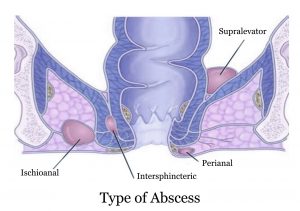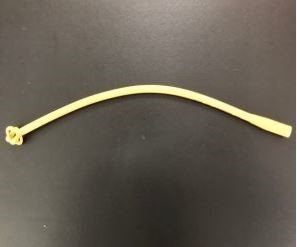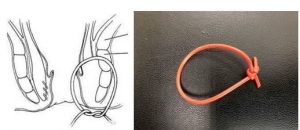What is anal abscess?
Anal abscess (perianal abscess, perirectal abscess) is an infected cavity and collection of pus around or inside the anus. There are various types of anal abscess. Some are more complex than others depending on the location of the abscess in relation to the anus and the sphincter muscles [Figure 1]. Anal abscess affects both genders from early childhood into late adulthood but it is most commonly seen in men between the age of 30 and 50 years.

Figure 1 – Various types of anal abscess
What causes anal abscess?
Multiple small glands are inside the anus. The glands make secretions and contribute to the normal function of the anus. In the majority of patients, an anal abscess is caused by an infection of one of the glands. Less common causes of anal fistula include inflammatory bowel disease such as Crohn’s disease, atypical infections such as tuberculosis, previous proctologic surgery, childbirth injuries, cancer, and prior radiation therapy.
What are the symptoms of anal abscess?
Patients with anal abscess have one or more of the following symptoms: severe pain, swelling, redness, fever, chills, fatigue, and/or pus drainage (a thick creamy whitish or yellowish secretion) from the anus or the skin.
How is anal abscess diagnosed?
The history and physical examination are sufficient to make the diagnosis of anal abscess. An office-based examination includes visual inspection of the skin and in some patients an anal examination using the finger and Anoscopy or Proctoscopy to look inside the anus and rectum. It is important to note that some patients may have a deeper abscess that is not visible externally. Occasionally, Dr. Maher Abbas may recommend an endoanal ultrasound, a CT scan (computed tomography), or MRI (magnetic resonance scan) to further assess. These additional tests are recommended in cases of recurrent abscess, in patients with incomplete or inconclusive physical examination, and in some patients with conditions such as Crohn’s disease.
How is anal abscess treated?
While a very small anal abscess may be treated initially with antibiotics, the majority of patients with anal abscess require prompt incision and drainage of the abscess. Although in select cases this can be done in the office under local anesthesia, often the procedure is performed in the operating room. On some occasions and depending on the type and complexity of the abscess, a small mushroom catheter [Figure 2] is inserted inside the abscess cavity to improve the healing. In patients with a clearly established Anal Fistula (an established tunnel from the infected gland into the abscess), a seton drain [Figure 3] is placed to facilitate subsequent procedures to heal the fistula.

Figure 2 – A mushroom catheter

Figure 3 – A seton drain
What happens after incision and drainage of anal abscess?
Depending on the severity of anal abscess, some patients may require hospitalization for 1 or more days for intravenous antibiotics and pain control. However, most patients are discharged home from the clinic or hospital within 24 hours of the procedure. Patients are advised to take any prescribed medications such as antibiotics and pain medications. Sitz Bath is recommended twice a day for comfort and to keep the area clean. High Fiber Food and Fiber Supplements, are recommended. A follow-up appointment is scheduled within 7 to 10 days of the procedure.
What happens if an abscess is left untreated?
An untreated anal abscess can get worse and cause a more severe pelvic infection that can become life threatening. Therefore, patients with anal abscess are advised to seek immediate treatment.
Why is it important to seek expert care with a board certified proctologist and colorectal surgeon?
Healing is anticipated within 1 month in most patients. However, 60 to 70% of patients with a first-time abscess will develop a second abscess or an Anal Fistula which will require additional surgical care. The anal area is a delicate part of the body. It is important to seek expert care in order to obtain the best long-term results. The expertise of the doctor is critical in order to minimize the risk of relapse, non-healing, infection, and weakness of the muscle. Furthermore, some patients need additional imaging tests or Colonoscopy to exclude other causes of anal abscess such as Crohn’s disease.

Dr. Maher Abbas is an expert in the treatment of diseases of the colon, rectum and anus. With over a 30-year career in the USA, he has completed advanced surgical training and is American Board Certified in Colon and Rectal Surgery. Dr. Maher Abbas is a Fellow of the American Society of Colon and Rectal Surgeons.
If you would like to schedule a consultation with Dr. Maher Abbas to discuss your case, click here.





